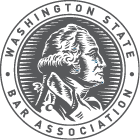Legal Assistance to Military Personnel Section
The WSBA Legal Assistance to Military Personnel (LAMP) Section addresses matters related to the rendition of appropriate and efficient legal service to members of the armed forces of the United States. Initially formed as a standing committee of the Washington State Bar Association in 1996, the LAMP Section was formed in October 2004.
Annual Report │ Budget │ Bylaws | Year in Review │ Elections | In the News
Join Now
Page Navigation
The Legal Assistance to Military Personnel Section offers many resources and benefits for members. On this page you will find information about the section, their upcoming events and offerings, as well as information about the section's executive committee.
Upcoming Programs
LAMP Executive Committee Meeting
The LAMP Executive Committee will be meeting at noon Friday, Feb. 27.
Meeting ID: 836 0780 6113 || Passcode: 125881
NEW Webinar! Military Justice Reform: The Legacy of a Dramatic WWI Court Martial
Developed in partnership with the WSBA Legal Assistance to Military Personnel Section
During World War I, the impact of community tensions, racial segregation, the draft, and the prospect of overseas combat deployment resulted in a number of controversial courts-martial, including a capital case that drew considerable national attention. Much of the attention focused on aspects of the military justice system in which trial and review procedures differed from civilian practices in significant respects, generating a variety of reform proposals and intense debates within the Army and in Congress. These developments will be the subject of the first segment of the CLE presentation.
Shortly after the war ended, congressional hearings and legislation resulted in enactment of a number of reforms in the Army's Articles of War. The second segment of the CLE presentation will discuss the legacy of those reforms and summarize a variety of proposals that were not enacted at that time. Many of those proposals would be revisited over the next 100 years—often featuring comparisons between military and civilian trials and review practices. The CLE presentation will address key turning points that produced legislation echoing many of the earlier proposals, including adoption of the Uniform Code of Military Justice in the aftermath of World War II, additional reforms during and after the Vietnam era, and further developments in the current century.
When: Mar. 12, 2026
Time: 11 a.m.–1 p.m. PST
Credits: 2.00 Other
Past Programs
Webinar Series on Evictions Representation
LAMP supports, protects and legally empowers America’s current and past uniformed military members. Patriots should expect no less. As part of this responsibility, LAMP provided, in conjunction with the AGO OMVLA, a three-part Mini-CLE series which addressed the empowerment of Veterans, through their counsel, in cases in which they erroneously face eviction from their homes. All Veterans deserve to have a home; the law, through dedicated professionals, should ensure it.
As such, we earnestly invite you to carefully listen to Part 1 of this insightful Mini-CLE series, which is available below. Part 1 analyzes the applicable legislations. Part 2 addresses the processes specific to eviction law, and Part 3, winning strategies at show cause hearings. Veterans deserve legal protection, and you, as advocates, are uniquely positioned to make a major difference in their lives, as they once, not long ago, did for you, and your family.
Part 1: Understanding the Changing Legal Landscape and How the Legal Community Can Help Veterans and Servicemembers at Risk of Being Evicted
This webinar, presented on June 25, 2021, reviews how the new legislation impacts the eviction process (RCW 59.12) and how it amended the Residential Landlord Tenant Act in Washington State (RCW 59.18). The webinar also provides information on opportunities to help veterans and service members at risk of being evicted.
FACULTY
Joyce Bruce, Attorney General’s Office of Military and Veteran Legal Assistance, Seattle
Scott Crain, Northwest Justice Project, Seattle
Watch now
This link is not accredited for CLE credit and is available for viewing for up to one year after the live event date (June 25, 2021).
LAMP in the News!
See the Section Spotlight feature in the November 2020 issue of Washington State Bar News:
LAMP at the Forefront of Helping Our Uniformed Folks in Washington State
Legislation
Attorneys Assisting Citizen-Soldiers and Families (AACF)
RCW's Relating Military Affairs and Veteran Affairs
SHB 1170 (parenting plans based on military service)
Resources
The following resources include information describing issues affecting military personnel. Lawyers, businesses, and members of the public will find help regarding reserve and active military personnel in all branches of service.
WSBA recommends that military personnel visit their base JAG office for specific information regarding particular questions.
Department of Defense Resources Washington State Department of Veterans Affairs |
Executive Committee
Chair: Stephen Carpenter Jr. (2024-2026) Vice Chair: Sean Mangan (2024-2026) Immediate Past Chair: Paul Apple (2024-2026) Secretary-Treasurer: Eric McDonald (2024-2026) Historian: Daniel Russ (2024-2026) New Member Liaison*: TBD *Nonvoting member | Legislative Committee Chair: Northwest Justice Project Liaison*: TBD Strategic Planning Committee* Law Student Liaison*: Vacant Board of Governors Liaison*: Christopher Bhang (2025-2026) |
Please contact subcommittee members for details on their upcoming meeting dates and locations.
To join the section list serve and for more general section questions, please send your email address and Bar number to sections@wsba.org. For more information and to get involved with the section, please contact the section chair.






